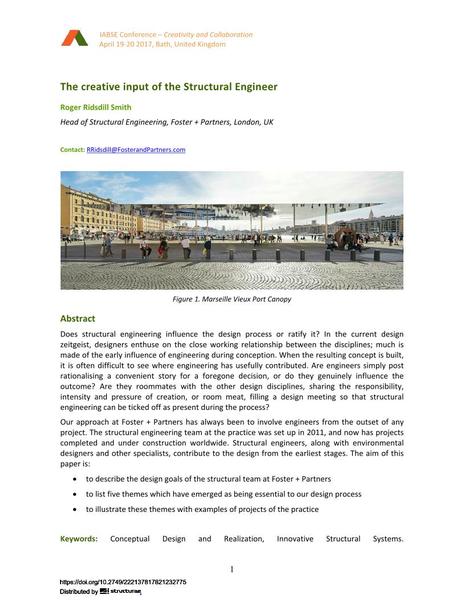The creative input of the Structural Engineer

|
|
|||||||||||
Détails bibliographiques
| Auteur(s): |
Roger Ridsdill Smith
(Head of Structural Engineering, Foster + Partners, London, UK)
|
||||
|---|---|---|---|---|---|
| Médium: | papier de conférence | ||||
| Langue(s): | anglais | ||||
| Conférence: | IABSE Conference: Creativity and Collaboration – Instilling Imagination and Innovation in Structural Design, Bath, United Kingdom, 19-20 April 2017 | ||||
| Publié dans: | IABSE Conference Bath, April 19-20, 2017 | ||||
|
|||||
| Page(s): | 1-9 | ||||
| Nombre total de pages (du PDF): | 9 | ||||
| Année: | 2017 | ||||
| DOI: | 10.2749/222137817821232775 | ||||
| Abstrait: |
Does structural engineering influence the design process or ratify it? In the current design zeitgeist, designers enthuse on the close working relationship between the disciplines; much is made of the early influence of engineering during conception. When the resulting concept is built, it is often difficult to see where engineering has usefully contributed. Are engineers simply post rationalising a convenient story for a foregone decision, or do they genuinely influence the outcome? Are they roommates with the other design disciplines, sharing the responsibility, intensity and pressure of creation, or room meat, filling a design meeting so that structural engineering can be ticked off as present during the process? Our approach at Foster + Partners has always been to involve engineers from the outset of any project. The structural engineering team at the practice was set up in 2011, and now has projects completed and under construction worldwide. Structural engineers, along with environmental designers and other specialists, contribute to the design from the earliest stages. The aim of this paper is:
|
||||
